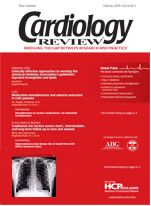Diuretics improve outcomes in older hypertensive patients with diabetes
Diuretic-based therapy of hypertension improves long-term outcomes, even among patients with diabetes and even though diuretic therapy
is associated with an increase in new diabetes, report researchers in the American Journal of Cardiology (2005;95:29-35).
This finding comes from long-term follow-up of patients enrolled in the Systolic Hypertension in the Elderly Program (SHEP), a trial of diuretic-based stepped-care antihypertensive therapy of isolated systolic hypertension (ISH) in individuals aged 60 years or older. The long-term analysis was led by John B. Kostis, MD, chief, division of cardiovascular diseases and hypertension, and chair, Department of Medicine, University of Medicine and Dentistry of New Jersey—Robert Wood Johnson Medical School, New Brunswick, New Jersey.
In SHEP, 4,732 patients with ISH were randomized to therapy starting with chlorthalidone, 12.5 to 25.0 mg daily, or placebo to achieve
goal blood pressure (systolic blood pressure below 160 mm Hg or a decrease of at least 20 mm Hg). Atenolol or reserpine could be added if blood pressure remained above goal.
At baseline, about 17% of the participants had diabetes. During follow-up, an additional 13.0% in the chlorthalidone group developed diabetes compared with an additional 8.7% in the placebo group (P < .001).
At a mean follow-up of 14.3 years, cardiovascular mortality was 19% lower (95% confidence inter-val [CI], 24.9% to 2.8% lower) in the overall group of patients assigned to chlorthalidone compared with placebo.
Participants who had diabetes at baseline had a higher mortality than those without diabetes at baseline (63% higher if they were assigned to placebo, 38% higher if randomized to a diuretic).
Those who were randomized to placebo and developed diabetes during the double-blind phase of the study (4.4 years) had a 35% higher mortality (95% CI, 5.1% to 72.7% higher) at 14.3 years than placebo recipients who did not develop diabetes. This effect was less pronounced and not significant among the subjects who developed diabetes while on diuretic-based therapy (15% increased mortality [95% CI, —7.5% to 11.7%]).
Subjects with diabetes at baseline or those who developed diabetes during follow-up had a 19.5% reduction (95% CI, 32.0% to 4.8%) in the risk of mortality if they were randomized to a diuretic compared with placebo. The rate of cardiovascular mortality was reduced by 32% (95% CI, 47.4% to 15.2%) in diabetic patients randomized to chlorthalidone relative to placebo.
The long-term findings from SHEP support national guidelines in which diuretics, in addition to beta blocking agents, angiotensin-converting enzyme (ACE) inhibitors, and calcium antagonists, are recommended as first-line therapy for hypertension, including patients who have diabetes, note the authors. They write that “the milder long-term course that occurred during diuretic therapy is likely related to the lesser degree of metabolic disturbance as judged by fasting glucose levels and proteinuria.” The
effects of diuretic-based therapy rel-
ative to placebo on metabolic param-
eters were small in this study, they add, with only slight differences in fasting glucose level, total cholesterol, and high-density lipoprotein cholesterol.
The study’s findings have important clinical implications given that approximately one third of people older than 60 years have both hypertension and diabetes, according to Valentin Fuster, MD, director, The Zena and Michael A. Wiener Cardiovascular Institute, Mount Sinai Medical Center, New York City.
Although chlorthalidone was associated with a significantly higher rate of new-onset diabetes than the ACE inhibitor lisinopril and the calcium antagonist amlodipine in the Antihypertensive and Lipid-Lowering Treatment to Prevent Heart Attack Trial (ALLHAT), the three agents were equally successful at preventing adverse cardiovascular events.
